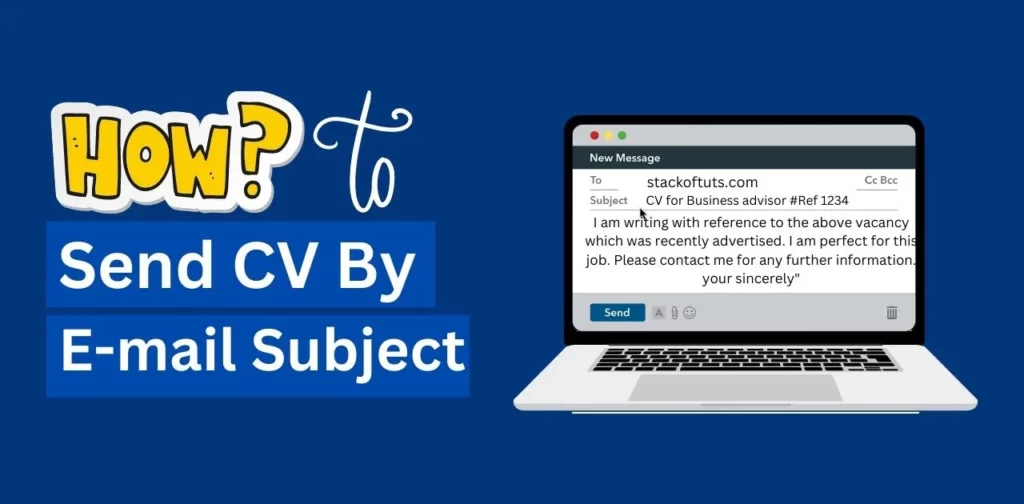
An email has become the main way for both job seekers and employers to talk to each other.
The subject line of your email is the first thing the recipient of your CV sees.
We’ll explore some tips and best practices to help you craft a winning subject line that will increase the chances of your CV getting noticed and considered.
It is crucial to ensure that the subject line of your email sticks out and demonstrates that you are qualified for the position.
We will also provide some example email subject lines to help you get started.
You will be able to develop an excellent email subject line that will increase the visibility of your application.
Tips for Sending Your CV by E-mail subjected
Emailing your resume is a frequent technique while searching for employment.
Recruiters get hundreds of emails daily, so your subject line must stand out.
Creating an engaging subject line may be the difference between your email getting opened and read and being discarded as spam.
Also, Learn the basics of email hosting and the best practices for crafting a compelling email subject line for your CV with our comprehensive guide.
Here are some tips to help you create the perfect subject line when sending your CV via email.
1. Keep it clear and concise
Regarding email subject lines, brevity is essential.
A lengthy and complicated subject line can be overwhelming for the recipient, who may choose to ignore it.
It is crucial to maintain clarity, conciseness, and directness in the subject line.
1. State the purpose of the email
In this scenario, the subject line should indicate that you are sending your resume.
A subject line as basic as “Application for [Job Title] – [Your Name]” might be beneficial.
2. Use a maximum of 6-8 words
Make your subject line concise, with no more than 6 to 8 words.
This will make it easy for the receiver to swiftly read and comprehend the email’s objective.
3. Avoid using unnecessary words
Avoid using words that don’t add any value to the subject line.
Avoid using “Hi” or “Hello” in the subject line, as it doesn’t add any useful information to the email.
4. Make it specific and informative
A good subject line should be specific and informative, giving the recipient a clear idea of what the email is about.
If you’re applying for a particular position, add the title in the subject line.
5. Use proper punctuation capitalization
Using proper punctuation and capitalization can make your email subject line look more professional and easier to read.
Avoid using all capital letters and numerous exclamation marks, since doing so might make an email seem spammy.
Examples of concise and clear subject lines include:
- “Application for Sales Manager – Abdul Sattar”
- ” Abdul Sattar- CV for Marketing Analyst Position”
- “Abdul Sattar ‘s CV for Social Media Manager Role”
These suggestions will boost the odds of your email being read and your Resume being evaluated.
2. Customize for the job
When it comes to job applications, there is no one-size-fits-all solution.
Each job ad is unique, thus the subject line of your email should reflect this. Your email may get seen more if the subject line matches the job you’re applying for.
Here are some suggestions for adapting your subject line to the job description.
1. Use the job title
Adding the job title in the subject line might facilitate the recruiter’s identification of your application.
Use the exact job title from the job ad to guarantee that your email is properly routed and sorted.
2. Include a reference number
If the job advertisement has a reference number, insert it in your subject line.
This might aid the recruiter in swiftly locating your application in their system, hence enhancing the efficiency of the recruiting process.
3. Use specific keywords
Could you ensure that your subject line contains keywords that represent the essential abilities and experience for the job?
This may help your email appear in the recruiter’s search results when they are seeking for people with those specific credentials.
4. Highlight your relevant experience
Include relevant experience or qualifications in your email subject line.
This might make your email stand out and highlight your qualifications for the job.
Examples of customized subject lines include:
- Subject Line: Experienced [Job Title] Seeking Opportunity at [Company Name]
- “Marketing Manager Application – Abdul Sattar (Ref: 12345)”
- “Abdul Sattar – Experienced Software Developer for Python Programming Position”
- “Social Media Specialist – Abdul Sattar – 3 years of Experience in Social Media Management”
By customizing your subject line to the specific job posting, you’ll demonstrate that you’ve read the job requirements and are genuinely interested in the position.
3. Use relevant keywords
Using pertinent keywords in the subject line of your email may make it stand out to recruiters and boost the probability that your CV will be seen.
Keywords are phrases related to the position you’re applying for that recruiters use to rapidly find qualified individuals.
Here are some suggestions for incorporating important keywords into your topic line.
1. Research the job requirements
When designing your subject line, investigate the job’s criteria and find the most relevant keywords. These may contain certain talents, credentials, or job titles.
2. Highlight your relevant skills and experience
After identifying relevant keywords, insert them in the subject line. By emphasizing your relevant abilities and expertise, you can make your application stand out and establish that you are a great contender for the job.
3. Avoid using buzzwords or jargon
After identifying relevant keywords, insert them in the subject line. Although it is crucial to utilize relevant keywords, it is equally essential to avoid buzzwords and jargon that the recruiter may not understand. Adhere to industry-standard, clearly identifiable terminology.
4. Don’t overdo it
Although utilizing relevant keywords might be advantageous, it is essential not to overuse them. Too many terms in the subject line might make your email seem spammy and unprofessional.
Limit yourself to a handful of terms that truly represent your talents and expertise.
Examples of subject lines that use relevant keywords include:
- “Abdul Sattar- Experienced Digital Marketer with SEO and Analytics Expertise”
- “Marketing Assistant Application – Abdul Sattar – Skilled in Content Creation and Social Media Management”
- “Abdul Sattar- Certified Project Manager – Applying for Project Management Position”
By including relevant keywords in the subject line of your email, you will enhance the likelihood that recruiters will read your message and examine your CV for the position.
Just be sure to include keywords that are relevant to the position and appropriately represent your abilities and expertise.
4. Keep it professional
When applying for a job by email, it is essential to maintain a professional and relevant subject line.
The subject line is the first thing recruiters will see, therefore it is essential to create a positive impression.
Here are some guidelines for maintaining a professional topic line.
1. Use appropriate language
Use proper English, devoid of slang, jargon, and other informal phrases, while designing your subject line.
Your email subject line should represent your professional job application.
2. Use a professional tone
The subject line of your email should have a professional tone and avoid seeming too casual or informal.
Avoid exclamation marks and other enthusiastic terms. Employ proper grammar, punctuation, and capitalization.
3. Avoid using personal information
Avoid putting your age, race, or marital status in the subject line.
Adding personal details on a job application might make it look unprofessional and discriminating.
4. Don’t use all caps or excessive punctuation
Subject lines that use all capital letters or excessive punctuation might seem spammy and unprofessional.
Observe correct capitalization and punctuation, and avoid using an excessive amount of symbols or special characters.
Professional subject lines should be concise, clear, and relevant to the content of the message.
- “Meeting Request,”
- “Important Update,”
- “Action Required,”
- “New Offer,”
- “Follow Up,”
- “Reminder,”
- “Feedback Request,”
- “Invitation,”
- “Welcome,”
- “Thank You,”
Examples of professional subject lines include
- “Abdul Sattar – Marketing Manager Application”
- “Experienced Software Developer – Abdul Sattar”
- “Project Manager Application – Abdul Sattar – PMP Certified”
By keeping your subject line professional and relevant, you will create a favorable impression on recruiters and boost your chances of being considered for the position.
Just keep in mind to emphasize your professional credentials and to exclude any extraneous personal details.
5. Highlight your USP
Your USP helps you stand out to recruiters.
Your USP (universal selling points) might be a talent, experience, or certification that’s relevant to the position.
Here are some tips on highlighting your USP in your email subject line:
1. Identify your USP
Before crafting your subject line, you should determine your unique selling proposition.
This might be a relevant skill, certification, or qualification.
2. Use your USP in your subject line
After finding your USP, use it in the email subject lines.
This can make your application stand out to recruiters and indicate that you possess a distinct set of relevant abilities or expertise.
3. Be specific
Be as clear as possible in your subject line when showcasing your USP.
Avoid utilizing imprecise phrases and generalizations; instead, emphasize what distinguishes you from other contenders.
4. Make it relevant
Ensure that your USP is relevant to the position for which you are seeking.
Instead of listing all your talents and experiences, emphasize those most relevant to the position.
Examples of subject lines that highlight your USP include:
“Abdul Sattar – Experienced Sales Manager with a Proven Track of Closing Large Deals”
“Digital Marketing Manager Application – Abdul Sattar – Skilled in Lead Generation and Email Marketing”
“Certified Scrum Master – Abdul Sattar – Applying for Agile Project Manager Position”
By emphasizing your unique selling proposition in the subject line of your email, you will boost your chances of attracting the attention of recruiters and landing the job.
Just be sure to be detailed and relevant, and use your USP to highlight your credentials and experience for the role.
conclusion
Sending emails by topic is an excellent method for ensuring that messages reach the intended recipients.
It enables you to categorize your emails and makes them simpler to locate.
It also prevents your emails from being lost in the influx of other communications.
Using subject lines increases the likelihood that your emails will be opened and read.
You can optimize email delivery.
Thanks!





